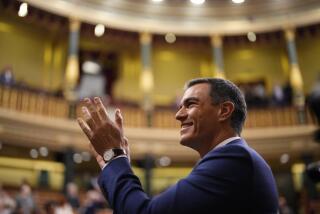EUROPE : The Party’s Over in Spain : Heady days of Expo and Olympics quickly fade into worries about the future.
- Share via
MADRID — Seasons change. A gigantic national celebration of Spain’s historic and democratic accomplishments is ending here, overtaken almost overnight by vexing questions about the Spanish future.
“It was a big fiesta, but now the accounts are coming due, and as usual it is the everyday people who are asked to pay,” said Maruja Torres, a naysaying columnist at the newspaper El Pais. All the hoopla over the 500th anniversary of Columbus’ voyage, she argues, was artifice obscuring the fact that Spain is far from becoming a front-rank nation in the new Europe.
“We have great art museums but lousy art education in the schools, people with four cars and no culture, too many low-income families we daren’t show to Europe--their lives are not photogenic enough,” Torres said.
But what a party. On Monday--Columbus Day both here and in a New World made possible by the 15th-Century explorer’s audacity--King Juan Carlos I and Socialist Prime Minister Felipe Gonzalez will bring down the curtain on Expo ’92 in Seville. Like the Summer Olympics in Barcelona, the fair is officially reckoned a great success. It boosted Spain’s international image as a modern First World democracy, and it pumped needed billions into the national infrastructure.
Alas, while everybody was dancing, the decade-long Spanish economic miracle that fueled the fun lost its fizz. With national elections drawing near, the economy in Spain is as flat as it is anywhere else in stagnant Western Europe. Bread-and-butter issues dominate political debate.
The Spanish peseta clings to the European Monetary System, but only after a devaluation of 5% and the loss of about 15% of the nation’s reserves spent defending it. The stock market has fallen more than 20% since January and is drifting uneasily at around 1986 levels. Forecasters fear that as many as 3 million of Spain’s 39 million people may be out of work next year.
To attack burgeoning problems of debt and deficit that are the aftermath of free-spending expansion, Gonzalez’s newly proposed 1993 budget calls for across-the-board reductions in government spending: Spain’s armed forces will reluctantly swallow a 10% budget cut.
Gonzalez accepts responsibility for the slowdown but defends government free-market economic policies that critics on his left dismiss as “socialism-lite.” Government supporters, including prominent business leaders grown fat in the good years, argue that Spain’s economic woes must be seen in continental context.
“Those who say we’ve lived above our means may be right. Just us?” asks Francisco Fernandez, the economic secretary of Gonzalez’s Socialist Party. “At least three members of the seven biggest industrial nations have serious problems too--and they didn’t have an Expo, an Olympics or a year as Europe’s cultural capital. There too the party is over.”
For Gonzalez’s right-wing opposition, runaway government spending is to blame. Opposition leader Jose Maria Aznar, head of the conservative Popular Party, charges that since Gonzalez’s reelection in 1989, the “government’s economic policy has been a complete failure.”
This week, Aznar demanded Spain’s withdrawal from the European Monetary System, terming Gonzalez’s reaction to monetary alarm “a calamity and a national barbarity.” Where Gonzalez pledges austerity to trim government bureaucracy, Aznar would use a chain saw, eliminating five ministries, 90 public bodies and 5,000 high-level jobs.
Gonzalez, who has been in power 10 years, must call elections within the next year to renew a Parliament where Socialists now fill 175 of 350 seats. He might have done so this fall in the Olympics-Expo afterglow, except for the economic alarm.
After its banner ‘92, the prospect for Spain, then, is an uncomfortable period of tightened belts followed by an election--probably next fall. By most estimates, the Socialists would fall short of an absolute majority but retain enough seats to stay in power as the senior partner of a coalition.
More to Read
Sign up for Essential California
The most important California stories and recommendations in your inbox every morning.
You may occasionally receive promotional content from the Los Angeles Times.













